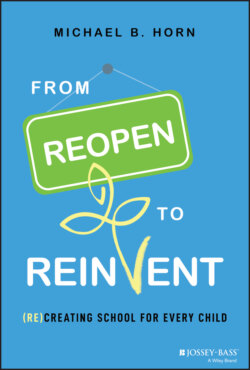Читать книгу From Reopen to Reinvent - Michael B. Horn - Страница 35
A BRIEF HISTORY OF THE PURPOSE OF SCHOOLING
ОглавлениеThe primary policy rationale for public schools' purpose has changed over time.2 In Disrupting Class, Clayton Christensen, Curtis Johnson, and I offered an overview of these shifts.3 Here's a brief summary.
Through much of the 1800s, a kind reading of history would say that the central role of public schools was to preserve the American democracy and inculcate democratic values.4
In the 1890s and early 1900s, competition with a fast-rising industrial Germany constituted a mini-crisis. The country shifted by creating a new role for public schools: to prepare everyone for vocations. That meant providing something for everyone, with a flourishing of tracks and courses and increased enrollment in high school, which in 1905 just one-third of children who enrolled in first grade ever attended.
Another purpose was added to America's schools in the late 1970s and early 1980s: keeping the country competitive. Although this one had echoes of the prior purpose, it was different, as the nation became consumed by how students were doing in school as measured through average test scores. The vast choices that students had in a “cafeteria style curriculum,” the landmark report “A Nation at Risk” noted, was one “in which the appetizers and desserts can easily be mistaken for the main courses.”5 Having something for everyone, in other words, was no longer a virtue. It was a vice.
Just 20 years later, the primary purpose shifted again. This time society asked schools to eliminate poverty by not just focusing on schools' average test scores, but instead to make sure that children in every demographic reached a basic measure of proficiency in core subjects. The theory of action was that academic achievement unlocked opportunity.
As that consensus has eroded in recent years, there has been some drift in the primary purpose of schooling from a political perspective. Given that erosion, clarifying an individual school's purpose is perhaps now an even more vital conversation to have to build a coherent school model.
